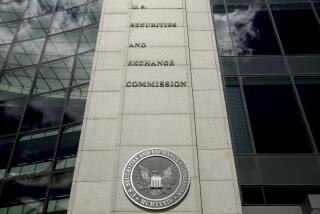How Defendants Allegedly Fixed Stock Price
- Share via
NEW YORK — The trading history of Topologix Inc., a Denver-based computer software concern that went public Oct. 4, 1988, for the equivalent of $1 a share, provides an example of how the defendants in the stock-rigging case unveiled Wednesday allegedly conspired to defraud investors.
According to the indictments, the fix was in even before the new issue was underwritten by two of the defendants, Wakefield Financial Corp. and G. K. Scott & Co.
“Prior to the commencement of trading,” the indictment charged, “the conspirators had agreed to cause the price of Topologix securities to rise substantially in subsequent trading.”
A month before the initial public offering, according to wiretaps quoted in the indictment, defendant John Kevorkian told defendant Alexander Minella that he would “plant a couple of big pieces” with certain clients at $1 a share.
Kevorkian allegedly added that he would “pull (the stock) right out (of those accounts) at the opening, at like 1 1/4 or 1 1/8,” and “put it out (to other clients) at 2 3/8.”
As planned, the stock shot up on the first day of trading. A day later, the wiretaps caught one broker telling another that he was selling Topologix stock to all of his clients for 2 3/8. “I’m (cheating) everybody, but I don’t care,” the broker is alleged to have said.
Topologix stock collapsed when Wakefield went out of business a year later.






